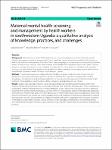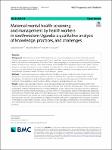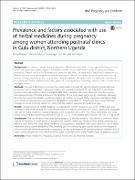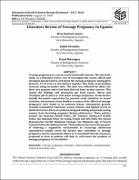Maternal mental health screening and management by health workers in southwestern Uganda: a qualitative analysis of knowledge, practices, and challenges
Abstract
Background Maternal mental health (MMH) problems, such as perinatal depression, maternal anxiety, suicide
ideation and puerperal psychosis among others, have a significant impact on maternal morbidity and mortality, as
well as the health and development of children. One in every four pregnant women and one in every five postpartum
women in low-income countries, suffer from maternal mental health (MMH) problems. Despite this, MMH screening,
diagnosis, and reporting remain scanty in Uganda. Consequently, this study aimed to investigate the knowledge,
practices, and impediments that maternity care workers face when screening and managing women with maternal
mental health disorders in health facilities in south-western Uganda.
Methods In-depth interviews were conducted with 22 health-care professionals who work in maternity care
departments in primary and tertiary healthcare facilities in southwestern Uganda to investigate their medical
knowledge, clinical practices, and challenges related to the screening and management of maternal mental health
problems. Using qualitative content analysis, distinct categories and subcategories were found.
Results Medical staff especially midwives lacked specialized training in screening and managing women with
maternal mental health problems They screened and managed MMH problems solely based on history and physical
examination, and they referred nearly every mother displaying signs of mental illness because they felt ill-prepared
to handle them. On the other hand, medical staff with some level of specialized training in mental health particularly
staff working in mental health units, were more likely to use a mental health screening tool in addition to history and
physical examination; and to treat any women exhibiting signs and symptoms of maternal mental problems without
referring them. Lack of in-service training on maternal mental health, poorly coordinated referral systems, reluctance
of mentally ill to visit medical facilities, scarcity of mental health specialists, and shortage of relevant medications
were identified as the major challenges. Age, experience level, or gender had no effect on screening or management
practices. Conclusions The results suggest that specialized training in mental health, and particularly maternal mental health,
is essential for the effective screening and management of maternal mental health conditions in South Western
Uganda.
Keywords Maternal Mental problems, Puerperal psychosis, Maternal mental health, Sub-saharan Africa, Uganda,
Maternal depression, Maternal anxiety, Maternal mental health
Collections
- Research Articles [19]
Related items
Showing items related by title, author, creator and subject.
-
Maternal mental health screening and management by health workers in southwestern Uganda: a qualitative analysis of knowledge, practices, and challenges
Nakidde, Gladys; Kumakech, Edward; Mugisha, John. F. (BMC Pregnancy and Childbirth, 2023)Background Maternal mental health (MMH) problems, such as perinatal depression, maternal anxiety, suicide ideation and puerperal psychosis among others, have a significant impact on maternal morbidity and mortality, as ... -
Prevalence and factors associated with use of herbal medicines during pregnancy among women attending postnatal clinics in Gulu district, Northern Uganda
Nyeko, Richard; Tumwesigye, Nazarius Mbona; Halage, Abdullah Ali (BMC Pregnancy and Childbirth, 2016)Background: According to World Health Organization (WHO) estimates, 80 % of the population living in rural areas in developing countries depends on traditional medicine for their health needs, including use during pregnancy. ... -
Literature Review of Teenage Pregnancy in Uganda
Anena, Mary Rachael; Orishaba, Judith; Mwesigwa, David (Advances in Social Sciences Research Journal, 2020)Teenage pregnancy is a serious social and health concern. The aim of the study, as a literature review, was to investigate the causes, effects and strategies put forward to curb down the teenage pregnancy among girls between ...




